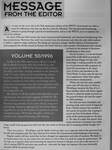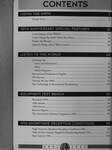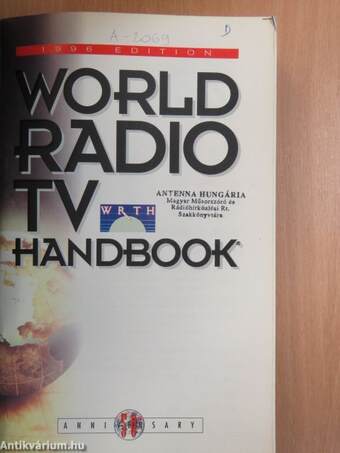1.067.905
kiadvánnyal nyújtjuk Magyarország legnagyobb antikvár könyv-kínálatát

VISSZA
A TETEJÉRE
JAVASLATOKÉszre-
vételek
World Radio Tv Handbook 1996
The most complete, accurate and up-to-date sourcebook on international broadcasting - Volume 50
| Kiadó: | Billboard Books |
|---|---|
| Kiadás helye: | |
| Kiadás éve: | |
| Kötés típusa: | Ragasztott papírkötés |
| Oldalszám: | 608 oldal |
| Sorozatcím: | World Radio Tv Handbook |
| Kötetszám: | |
| Nyelv: | Angol |
| Méret: | 23 cm x 15 cm |
| ISBN: | 0-8230-5927-8 |
| Megjegyzés: | Színes és fekete-fehér fotókkal, térképekkel. További kapcsolódó személyek a kötetben. |
naponta értesítjük a beérkező friss
kiadványokról
naponta értesítjük a beérkező friss
kiadványokról
Fülszöveg
MESSAGE
FROM THE EDITOR
s it says on the cover, this is the 50th anniversary edition of the WRTH. Anniversaries are often a cause for celehration, but they can alsó be a time for reflection. The international broadcasting industry is going through a period of transformation, and so is the WRTH, as we re-examine our role in the industry.
For most of the past half century, the terms 'international broadcasting' and 'shortwave broadcasting' have been synonymous. Shortwave has, until very recently, been the dominant and often the only viable médium to deliver a signal to target audiences. But things are starting to change. Satellite delivery of international radio programs has already started in Europe and North America, and a number of broadcasters have already
_ cut back on the amount of shortwave
broadcasting to these areas.
For the moment, it is the developed areas of the world which are seeing the most obvious change, but the same technology is making possible the delivery... Tovább
Fülszöveg
MESSAGE
FROM THE EDITOR
s it says on the cover, this is the 50th anniversary edition of the WRTH. Anniversaries are often a cause for celehration, but they can alsó be a time for reflection. The international broadcasting industry is going through a period of transformation, and so is the WRTH, as we re-examine our role in the industry.
For most of the past half century, the terms 'international broadcasting' and 'shortwave broadcasting' have been synonymous. Shortwave has, until very recently, been the dominant and often the only viable médium to deliver a signal to target audiences. But things are starting to change. Satellite delivery of international radio programs has already started in Europe and North America, and a number of broadcasters have already
_ cut back on the amount of shortwave
broadcasting to these areas.
For the moment, it is the developed areas of the world which are seeing the most obvious change, but the same technology is making possible the delivery of international radio programs on local FM transmitters in the major cities of Africa and elsewhere in the Third World. In these cases the new ser-vices supplement, rather than replace, the shortwave transmissions.
Within the next few years, another major step will take place in Africa as WorldSpace launches the first of its L-Band satellites which will deliver signals directly to relatively simple receivers on the ground without the need for expen-sive dish antennas.
But there are more immediate and pressing needs, and a touch of ingenuity from a British inventor has resulted in the launch of a product that is going to enrich the lives of hundreds of thou-sands of the poorest people on the plánét. The idea of a radio that doesn't need mains electricity or batteries, but works using a small wind-up generátor built into the case, seems so obvious that it's amazing nobody thought of it before.
These two projects - WorldSpace and the Baylin wind-up radio, are at opposite ends of the spectrum both literally and metaphorically. But they illustrate how diverse the international média landscape is becoming.
Regular readers will have noted that we have changed our appearance and order of contents. We think it's an improvement, but you the reader have the chance to teli us what you think by using the questionnaire. We do ürge you to spend a little time answering the questions, because it will give us an up-to-date picture of who is reading WRTH and what your needs are - obviously the larger the response, the more statistically accurate will be the picture we get.
VOLUME 50/1996
As this is the 50th anniversary edition I would like to thank everyone who has worked on, and been involved in, WRTH for the past half century. I'm still a new boy', having worked on the book for 'only' 17 years. Somé of our contributing editors have been with the book much longer than that, and it's a tribute to their often astonishing dedica-tion and commitment that they have remained with us for so long — and hopefully they will continue for a long time yet.
My thanks to all the readers and advertisers, past and present, for your loyal support of WRTH. We will continue to serve the needs of the international broadcasting industry in the years ahead, using new technology wherever appropriate, but never forget-ting that we are in the business of person-to-person communication. With that thought, I wish you another year of good listening and viewing. Vissza
Témakörök
- Művészetek > Rádió-TV-újságírás
- Idegennyelv > Idegennyelvű könyvek > Angol > Műszaki
- Idegennyelv > Idegennyelvű könyvek > Angol > Művészetek > Egyéb
- Idegennyelv > Idegennyelvű könyvek > Angol > Évkönyvek, kalendáriumok
- Műszaki > Elektronika > Televízió
- Évkönyvek, kalendáriumok > Évszám szerint > 1996-2000
- Évkönyvek, kalendáriumok > Témakör szerint > Idegennyelvű
- Évkönyvek, kalendáriumok > Témakör szerint > Művelődés > Művészet
- Évkönyvek, kalendáriumok > Témakör szerint > Műszaki
- Idegennyelv > Idegennyelvű könyvek > Angol
- Műszaki > Idegennyelv > Angol
- Műszaki > Elektronika > Rádió
Megvásárolható példányok
Nincs megvásárolható példány
A könyv összes megrendelhető példánya elfogyott. Ha kívánja, előjegyezheti a könyvet, és amint a könyv egy újabb példánya elérhető lesz, értesítjük.








